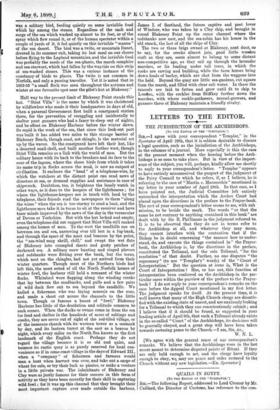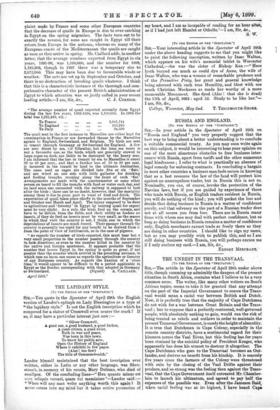QUAILS IN EGYPT. [To THE EDTTOR OF THE " spEcrwron.1
Sra,—The following Report, addressed to Lord cromer by Mr. Caillard, the Director of Customs, has reference to the corn- plaint made by France and some other European countries that the decrease of quails in Europe is due to over-catching in Egypt on the spring migration. The facts turn out to be exactly the reverse, for none are caught in Egypt till their return from Europe in the autumn, whereas on many of the European coasts of the Mediterranean the quails are caught as soon as they arrive in spring. Mr. Caillard adds, in another letter, that the average numbers exported from Egypt in six years, 1891-96, was 1,100,000, and the number for 1898, 1,183,308, though in 1897 there was a temporary rise to 2,072,000. This may have been due to favourable winds or weather. The nets are set up in September and October, and there is no destruction of breeding quails whatever. I think that this is a characteristic instance of the thorough and com- prehensive character of the present British administration of Egypt to which attention was so justly called in your recent leading article.—I am, Sir, &c., C. J. CORNISH.
"The average number of quail exported annually from Egypt during the last five years, 1892-1896, was 1 100 000. In 1896 the total was 1,231;489, viz. : To France ... „.„ ... 1,041,744 To England ... . ... • 155,245 To Italy 34,500
The quail sent in the first instance to Marseilles are either kept for consumption in France or are forwarded thence by the Marseilles agents to England, Switzerland, and Belgium. No birds are sent in transit through Germany or Switzerland for England. A few are sent direct by sea, rid Gibraltar, but the long. sea route is not a favourite one, as the birds, which are generally stowed in large cages on deck, are liable to be destroyed by the heavy seas. I am informed that the loss in transit by sea to Marseilles is about 30 to 40 per cent., and that a further loss of 10 to 20 per cent. Is incurred in the transit by land to the ultimate destination. The cases used as cages are divided into five or six fiats,' and are wired on one side with little galleries for drinking and feeding troughs, running along the front of each fiat.' Arrangements are made with the quartermaster or some other person on board to fill the troughs with food or water each day, and on land some one connected with the railway is supposed to look after the birds ; there can be no doubt, however, that the mortality among them is due in great part to want of food and drink. The exportation of quail takes place chiefly in the months of September and October and March and April. The injury supposed to be done to agriculture and 'forestry' in Egypt by snaring quail for export must be very slight. As a rule, the birds feed on the cereals, and have to be driven from the fields, and their utility as feeders on insects, if they do feed on insects must be very small, as the season in which they visit the country is not, I think, one in which the depredations of insects are much feared. Their passage through the country is generally too rapid for any benefit to be derived from it from the point of view of fertilisation, as in the case of pigeons.
"As regards the number of birds exported, this must bear but a very small proportion to the number passing through the country in both directions, or even to the number killed in the country by the native and foreign sportsmen. It appears probable that the number that leaves Egypt in the spring is quite as great, if not greater than the number which arrived in the preceding autumn in which case no harm can ensue as regards the agriculture or forestry of any European country. As regards the fixation of a close time,' it would appear to be difficult to fix a period applicable in Egypt or the Soudan corresponding with that adopted in Germany
or Switzerland. (Signed) A. CAILLARD.
April 15th."







































 Previous page
Previous page